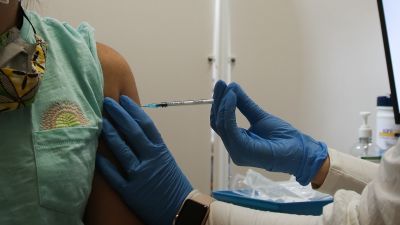At risk children in Wales to get Covid vaccine but no universal rollout for under-18s

Children over the age of 12 who have underlying health conditions, and are at an increased risk of Covid-19, are to be offered a vaccine in Wales.
Health Minister Eluned Morgan said she accepted the advice from the independent Joint Committee on Vaccination and Immunisation (JCVI), which has ruled out mass vaccination of healthy children for now.
It means thousands of children in Wales aged 12 to 15 with the following conditions will be able to access the vaccine: severe neuro-disabilities, Down's syndrome, immunosuppression, multiple or severe learning disabilities.
Under the existing guidance, young people aged 16 to 17 with underlying health conditions which put them at higher risk of serious Covid should have already been offered a jab.
The JCVI has also said those aged 12 to 17 who live with an immunosuppressed person should be offered a vaccine.
The JCVI is not currently advising routine vaccination of other children under the age of 18 because of the "low incidence and of Covid-19" in younger people.
What are the Covid rules in Wales from 17 July?
Meeting indoors
Meeting indoors
Up to six people from different households can meet indoors in private homes and holiday accommodation.
Previously you had to form an extended household or 'bubble' in order to see people at home - and your extended household could not change.
Up to six people from different households are already able to meet in 'regulated indoor premises' - for example, cafes, restaurants, pubs and visitor attractions.
Organised indoor events
Organised indoor events
Organised indoor events can take place in Wales for up to 1,000 seated and up to 200 standing, and ice rinks can reopen.
However, nightclubs and adult entertainment venues will remain closed until at least 7 August, when it is hoped Wales will move to 'Alert Level Zero'.
Social distancing
Social distancing
Social distancing will no longer be a legal requirement outdoors. Instead, risk assessments will be carried out to ensure people's safety.
Social distancing remains a legal requirement indoors.
Face coverings
Face coverings
Face coverings will continue to be required by law in most indoor public places and on public transport, as previously announced.
Working from home
Working from home
People should continue to work from home where possible, and there is no end date for this advice at present.
A Covid-19 risk assessment must be carried out when it is "necessary" for people to return to the workplace, the First Minister said.
Travelling abroad
Travelling abroad
People who have been fully vaccinated will no longer need to self-isolate if they are returning from an amber list country, in line with the position in England and Scotland.
However, the First Minister said: "We continue to advise against all but essential travel abroad and we continue to strongly recommend to people to holiday at home this summer."
The health minister said: "Covid rates in children are relatively low and there is still limited information about the overall direct effects of the virus on them.
"However, studies are emerging which show that this risk is very low in children, especially in comparison with adults, and similar to the secondary health complications of other respiratory viral infections in children.
"My officials remain in close contact with the Royal College of Paediatrics and Child Health on this matter and have established a group to consider the impacts of Long Covid on both adults and children and co-ordinate the wide ranging response needed."